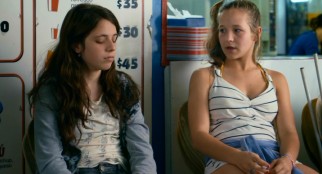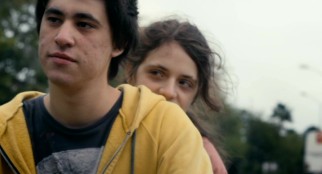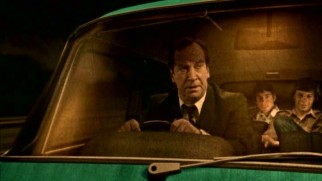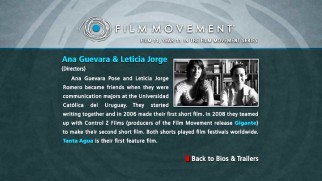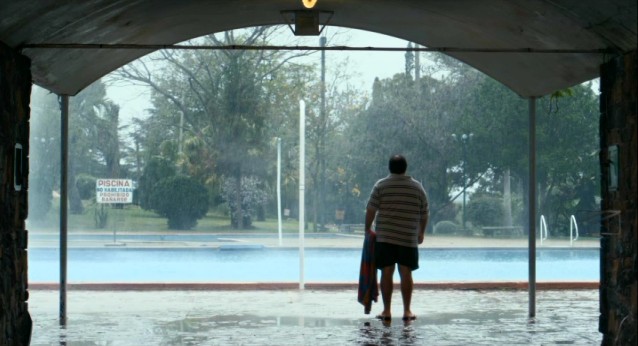Tanta Agua DVD Review
 |
Tanta Agua (So Much Water)
Uruguayan Theatrical Release: May 10, 2013 / Running Time: 103 Minutes / Rating: Not Rated Writers/Directors: Ana Guevara Pose, Leticia Jorge Romero Cast: Néstor Guzzini (Alberto Mazzoti), Malú Chouza (Lucía "Lu" Mazzoti), Joaquín Castiglioni (Federico "Fede" Mazzoti), Sofía Azambuya (Madelón), Pedro Duarte (Santiago "Santi"), Andrés Zunini (Diego), Romina Rocca (Receptionist), Valentino Muffolini (Miguel Ángel) 1.85.1 Anamorphic Widescreen, Dolby Stereo 2.0 (Spanish) Subtitles: English / Closed Captioned / English Extras Not Subtitled or Captioned DVD General Retail Release Date: May 13, 2014 (Film-of-the-Month Club Debut: November 1, 2013) Suggested Retail Price: $24.95 / Clear Keepcase / Single-sided, dual-layered disc (DVD-9) Also available on Amazon Instant Video |
Buy Tanta Agua from Amazon.com: DVD • Instant Video
In Tanta Agua, a divorced Montevidean father and his two children take a week-long vacation near Salto, "the spring water capital" of Uruguay. At first, it seems like our protagonist is the father, Alberto (Néstor Guzzini), In time, though, the focus turns to Lucía (Malú Chouza), Alberto's daughter who looks about 14 years old. Lucía (Lu for short) shows little interest in doing anything with either Dad or her 10-year-old brother Federico (Joaquín Castiglioni). She befrends Madelón (Sofía Azambuya), a prettier girl of around the same age. Their friendship isn't the most heartwarming, as the girls smoke and drink together, with no apparent legal hurdles. On a night out, a boy catches Lucía's eye, but it's clear upon reconnecting that he's only interested in Madelón.
Perhaps aware of that, Lucía arranges for the girls to meet up with that boy, Santi (Pedro Duarte), at a Salto dance club, without telling Madelón about it. Dad reluctantly approves of the plans, sold with some exaggeration after a day of father-daughter bonding of fishing and a pair of sunglasses stolen together. The night does not go as planned and Tanta Agua concludes not long after that, exploring the fallout from that evening of deception that leaves Lu feeling sick.
The feature film debut of Uruguayan writers-directors Ana Guevara Pose and Leticia Jorge Romero, Tanta Agua is a realistic and believable coming-of-age drama. Dedicating the film to their fathers, the two female filmmakers seem to remember adolescence vividly: Such elements aren't greatly missed because there's enjoyment to be had simply in spending a strained vacation that falls short of everyone's expectations. That experience feels like a universal rite of passage. Even if no one childhood trip stands out in your mind as a complete bust, the moments depicted here will jog your memory back to your own family's trips. Pose and Romero opt for atmosphere over plot and succeed with looks at mundane things like that joyless Boggle game, insect repellent application, and a boring water plant tour. Though there isn't much of a beginning, a middle, or an end, the slow, unremarkable journey itself feels rewarding as we get to observe and relate to a slice of life for these ordinary characters.
VIDEO and AUDIO
Picture quality on the 1.85:1 anamorphic widescreen transfer looks fine for standard definition, with no noticeable flaws arising. The Spanish soundtrack is offered exclusively in Dolby 2.0 and it gets the job done without problems or remarkable features. The optional English subtitles are commendable and grammatically sound.
BONUS FEATURES, MENUS, PACKAGING and DESIGN
The DVD's principal extra is the 2002 bonus short Home Road Movies (12:06) from director Robert Bradbrook. Unrelated to the film other than in themes, this appealing British jaunt tells of a a father finally gets a car, A Bios & Trailers section holds a single-page, joint biography for the two directors and Tanta Agua's trailer (1:38).
The DVD opens with trailers for Watchtower, In the Name Of, Key of Life, and Film Movement's Film-of-the-Month Club.
Those trailers, as well as ones for Off White Lies, Somers Town, and Gigante are also accessible from the trailers section, while the Film Movement promo is found on a page describing the company.
The main menu attaches score and rain sounds to clips from the movie placed under the studio's usual listings.
A final extra is found inside the clear keepcase. The reverse side of the cover artwork includes two paragraphs defending Film Movement's selection of this film (which with black print on a dark blue back are tough to read) and a two-paragraph note from the directors discussing their first film.
CLOSING THOUGHTS
There's an easy case to make against Tanta Agua's lack of a plot and structure, but an easier case for simply enjoying this candid, authentic Uruguayan character study for what it offers. The likable bonus short Home Road Movies adds some value to a Film Movement DVD that is light, routine, and adequate.
Buy Tanta Agua from Amazon.com: DVD / Instant Video
|
Related Reviews:
DVDizzy.com | DVD and Blu-ray Reviews | New and Upcoming DVD & Blu-ray Schedule | Upcoming Cover Art | Search This Site
DVDizzy.com Top Stories:
The Way, Way Back • The Deflowering of Eva van End • Garibaldi's Lovers • City of Men
New: Mr. Hobbs Takes a Vacation • Labor Day • Her • The Great Beauty • The Past
Text copyright 2014 DVDizzy.com. Images copyright 2014 Film Movement and Control Z Films.
Unauthorized reproduction prohibited.

